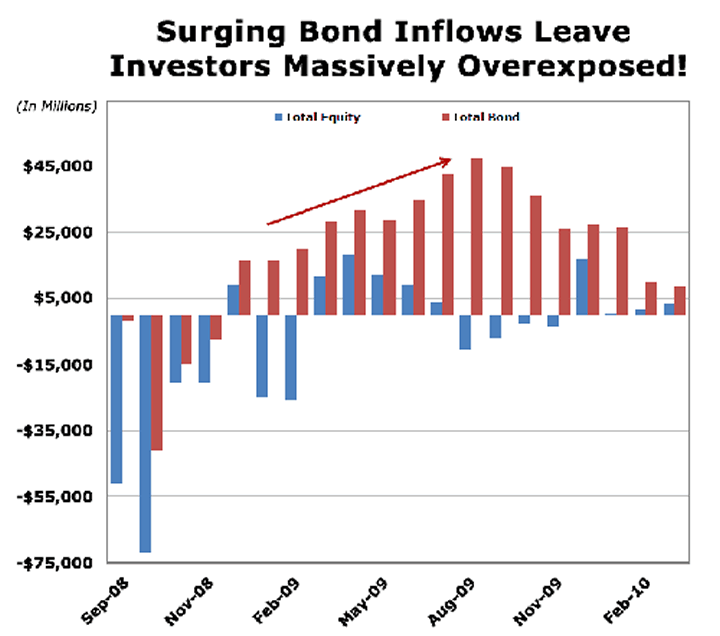Worried About U.S. Treasury Bonds
Interest-Rates / US Bonds Apr 10, 2010 - 02:07 AM GMTBy: Mike_Larson
 Stop me if you’ve heard this one before …
Stop me if you’ve heard this one before …
First, the Federal Reserve slashes interest rates and floods the economy with cheap, easy money.
Second, some asset class starts to benefit from the influx of that nearly-free cash.
Third, individual investors see all the money being made and dogpile into that asset class like crazy.
Fourth, the market blows up. Investors lose boatloads of money. And the Fed washes its hands of the affair, kind of like former Chairman Alan Greenspan tried to do with housing in Congressional hearings this week.
 |
| While in front of the Financial Crisis Inquiry Commission, Greenspan refused to shoulder any responsibility for the toxic debt that sparked the housing crisis. |
It happened with dot-bombs. It happened in real estate. And I believe it has happened more recently in long-term debt.
Worse, investors are more exposed to a potential blow up now than at virtually any other time in recent memory! That’s why I worry so much about the bond market — and why you should too.
The Evidence Is Irrefutable — Investors Are Chasing Performance Again
Back in the halcyon days of the housing bubble, Ivory Tower economists at the Fed didn’t see anything wrong. But those of us who actually hit the pavement to see what was going on had no trouble spotting a bubble in the making …
One of the most glaring, obvious indicators?
Investors were piling into residential real estate like never before. Lines snaked around the block whenever some condo or single family home developer threw up a shingle. Cocktail party talk centered on how rich everyone was getting from flipping homes.
Indeed, at the height of the housing bubble in 2005, the share of houses purchased as second homes or investments rather than primary residences hit 40 percent. That was up from 34 percent a couple years earlier and the highest percentage ever, according to the National Association of Realtors.
You knew it couldn’t last — and that all these so-called investors would get creamed. And sure enough, they did.
Now the same “can’t lose,” herd-type behavior appears to be at work in bonds.
Look at this startling chart below, based on data from the Investment Company Institute. The ICI tracks net money flows — where actual investors are directing real dollars in the mutual fund industry …

You can see that starting in late 2008, bond funds began to pull ahead of stock funds in popularity — and not by a small margin.
In February 2009, for instance, bond funds took in a net $16.8 billion. Stock funds actually lost $24.9 billion in investor cash.
In August 2009, bond fund inflows swamped stock fund inflows by a ratio of almost 11 to 1 — $43 billion vs. $4 billion.
Then in September 2009, bond funds took in a whopping $47.7 billion in investor money. Stock funds? They saw outflows of $10.2 billion.
If this were occurring during a period where the stock market was collapsing, it’d be understandable. After all, investors frequently “fly to quality” when panic sets in, dumping stocks and loading up on Treasuries …
But these dismal stock flow figures came at a time when the market was climbing. Surging, even. The evidence from the ETF market tells the same story: Investors have been dogpiling into bonds over stocks across the board.
Don’t Get Caught When Bonds Take Their Turn in the Woodshed!
There’s nothing wrong with following the herd for a while. You could have made a lot of money trading tech stocks in the late 1990s or flipping real estate in the early-to-mid-2000s. The trick is knowing when to cash in your chips and leave the table.
My view?
I said in December 2008 that Treasuries looked like the biggest bubble of all time, and that they would tank. They did.
 |
| The days of making easy money on bonds are gone. |
A few years earlier, I said the housing market was a massive bubble and urged you to dump all of your residential real estate investments because they were going to plunge. They did.
Now I believe it’s time to part with all of your longer-term debt. Not just Treasuries. But municipals, corporates, and junk bonds too …
They’ve benefitted from the huge money flows I described earlier. And those flows have led to “spread compression” — a shrinking difference between their yields and yields on similar-term Treasuries.
But I think that game is up … the easy money’s been made. Rising long-term rates are going to start hurting all long-term bonds, not just Treasuries.
Or in plain English, if you don’t get out of the way before the rest of the herd decides to change direction, you’re going to get run over!
Until next time,
Mike
P.S. I’ll be attending the Money Show at Caesars Palace in Las Vegas in early May, and I’d love it if you could join me.
The conference runs from Monday, May 10 through Thursday, May 13. You can register by giving the folks at the Money Show a call at 800-970-4355. Mention the priority code “018207.” You can also register online at https://secure.moneyshow.com/..
In Las Vegas, feel free to stop by booth #422 to chat. You can also join me for my presentation, Debts, Deficits and the Great Bond Market Crash of 2010-2011, to be held on May 13 from 10:30am — 11:15am PST. I’m looking forward to seeing you there.
This investment news is brought to you by Money and Markets. Money and Markets is a free daily investment newsletter from Martin D. Weiss and Weiss Research analysts offering the latest investing news and financial insights for the stock market, including tips and advice on investing in gold, energy and oil. Dr. Weiss is a leader in the fields of investing, interest rates, financial safety and economic forecasting. To view archives or subscribe, visit http://www.moneyandmarkets.com.
© 2005-2022 http://www.MarketOracle.co.uk - The Market Oracle is a FREE Daily Financial Markets Analysis & Forecasting online publication.



